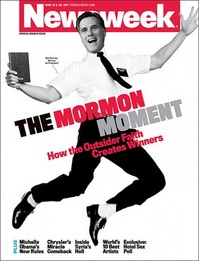Could an atheist be a statesman? What about a Mormon?

Will Republican presidential contender Mitt Romney's Mormon faith prove to be an obstacle in the campaign?
Photo courtesy of WikiMedia Commons
Editor's note: This post is part of a series by Dr. Baker on Our Values about core American values. This week Dr. Baker is discussing the concept of a "statesman" — a woman or man in politics who is a virtuous leader, one who puts the public good above partisanship.
Could an atheist be a statesman? What about a Mormon? Or, could a true statesman be Muslim? Or Jewish?
Just as the classic definition of a statesman doesn’t include a person’s private relationships, which we discussed yesterday, the definition also doesn’t address matters of religion. At least in theory, religion and statesmanship are two separate things.
But, right now, questions of religious affiliation rank among the hottest headlines in news media. Can a wise, experienced, nonpartisan leader also take a minority approach toward faith? The issue is on the front cover of Newsweek. And, it’s in the blog of one of the country’s top religion newswriters: Bill Tammeus.
“Religion matters in politics only insofar as a candidate’s religious beliefs might affect public policy or his or her ability to perform the duties of the office,” Tammeus writes in his blog, Faith Matters. “Beyond that it shouldn’t matter, though clearly it does to a big chunk of the population.”
That’s the rub. Religion matters in America, and it matters a lot in politics and elections — especially in many voters’ images of acceptable statesmen.
Now that Mitt Romney is the Republican frontrunner, questions of religion arise once again. Putting aside the question of whether Romney qualifies as a statesman, could he — a Mormon — be elected president?
Two-thirds (68 percent) of Americans say it wouldn’t matter to them if a candidate was Mormon, according to a new Pew survey. But 25 percent said it would, and they would be less likely to support a Mormon. Only 5 percent say they would be more likely to support a Mormon like Romney.
Opposition to a Mormon candidate makes odd allies. More than 40 percent of liberal democrats wouldn’t support a Mormon for the highest office, and about a third (34 percent) of white evangelical Protestants wouldn’t either.
Evangelicals tend to oppose Mormons on points of religion. Liberal Democrats oppose Mormons mainly because this religious group tends to be socially conservative.
The Pew poll did have some bright points. Race, ethnicity and gender don’t seem to matter much anymore. Large majorities say that it wouldn’t matter if a candidate were black, Latino or a woman. On this, Democrats, Republicans, and independents agree.
Do you think that religion should matter in what makes a statesman?
How do you feel about Romney as the Republican candidate?
Remember: This week I’m asking you to nominate someone for The Lincoln Award for Statesmanship. This non-partisan award is given annually by The Statesman Group.
Please, add a comment below! And spread the word on Facebook!
Dr. Wayne E. Baker is a sociologist on the faculty of the University of Michigan Ross School of Business. Baker blogs daily at Our Values and can be reached at ourvaluesproject@gmail.com or on Facebook.


Comments
1959Viking
Fri, Jul 8, 2011 : 1:29 p.m.
Religion does matter. Because religion and faith develop your values system. Your values system greatly influences how you see and respond to the issues you face as a representative. It bothers me greatly when people say they can "set aside" their faith and personal beliefs to respond to an issue in an "objective unbiased manner." First, if you can set aside your values and beliefs you don't have any. Second, if you are arrogant enough to believe you have no biases you shouldn't be representing anybody. Be bold enough and honest enough to state your beliefs and convictions and then let the voters decide if that is who they want to represent them.
BhavanaJagat
Thu, Jun 9, 2011 : 3:54 p.m.
The Statesman Group is obsessed with their idea of finding a person to whom they can give their award. If this award is not symptomatic of Obsessive-Compulsive Neurosis, I would ask them to state the values they want to promote. The issue is not about religion and faith in God. The existence of God is not dependent upon our opinions about God. Religion may impact our social behavior but it will not give us the ability to directly rule or govern the individual cells that are the building blocks of the human body. The cells are autonomous and man painfully learns about cellular autonomy when his existence faces a grave risk such as a life threatening cancer. A good statesman must know that he/she exists in the world with no choice or ability to govern or rule the cellular functions of one's own body.
Rork Kuick
Thu, Jun 9, 2011 : 1:56 p.m.
This is a place holder for an incendiary comment desired by the author. An actual comment of that type may appear if the author ever states their opinion about anything. Anything at all.
Gaboo
Thu, Jun 9, 2011 : 12:45 p.m.
So, what's the answer about atheists? It doesn't matter to me whether a person is an atheist or a religionist as long as the decisions made are for the good of the people and good of the state. And, it is entirely possible - even likely - that someone without religious dogma would make better decisions - ones based on fact rather than faith.
nixon41
Thu, Jun 9, 2011 : 11:51 a.m.
What about integrity?